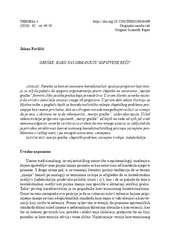Greške - kako nas obmanjuju sopstvene reči?
Error theory: How we came to be bamboozled by our own words?
| dc.creator | Pavličić, Jelena | |
| dc.date.accessioned | 2021-10-12T12:55:52Z | |
| dc.date.available | 2021-10-12T12:55:52Z | |
| dc.date.issued | 2019 | |
| dc.identifier.issn | 0351-2274 | |
| dc.identifier.uri | http://reff.f.bg.ac.rs/handle/123456789/2748 | |
| dc.description.abstract | Neretko se konverzacionom kontekstualisti upućuju prigovori koji imaju za cilj da pokažu da njegova argumentacija protiv skeptika na osnovama ,,teorije greške" formira sliku jezičke prakse koja je neodrživa. U ovom članku autorka nastoji da utvrdi u čemu leže smisao i snaga tih prigovora. U prvom delu teksta ilustruju se ključne tačke u pogledu kojih se kontekstualističko rešenje skeptičkog problema procenjuje kao veoma privlačno, dok se u drugom navode mnogobrojni razlozi za sumnju da je ono, s obzirom na to da inkorporira ,,teoriju greške", zadovoljavajuće. Usled rekonstrukcije prigovora upućenih ,,teoriji greške" od kojih na neke od njih još uvek nemamo odgovor, autorka završava sa uvidom da ima mnogo osnova za zaključak da je prividna atraktivnost konverzacionog kontekstualističkog pristupa saznajnim problemima u velikoj meri, i po mnogim osnovama, umanjena. | SR |
| dc.description.abstract | The conversational contextualist is frequently faced with objections which aim to show that her anti-skeptical argument founded on an "error theory" portrays a picture of the actual linguistic practice which is unsustainable. In this article, the author strives to ascertain what is the validity and argumentative power of these objections. The first part of the text illustrates the key points on which the contextualist solution of the sceptical problem is assessed as appealing, while the second part cites multiple reasons to doubt its credibility, given that it incorporates an "error theory". Given the reconstruction of objections to the "error theory", some of which we do not yet have an answer to, the author closes with the insight that there is sufficient grounds to conclude that the appeal of the conversational contextualist approach to problems of knowledge is, to a large extent, and on multiple grounds, reduced | EN |
| dc.publisher | Srpsko filozofsko društvo, Beograd | |
| dc.rights | openAccess | |
| dc.source | Theoria | |
| dc.subject | teorija greške | SR |
| dc.subject | skeptički problem | SR |
| dc.subject | saznajna tvrdnja | SR |
| dc.subject | indeksikalije | SR |
| dc.subject | skeptical problem | EN |
| dc.subject | knowledge sentence | EN |
| dc.subject | indexicals | EN |
| dc.subject | error theory | EN |
| dc.title | Greške - kako nas obmanjuju sopstvene reči? | SR |
| dc.title | Error theory: How we came to be bamboozled by our own words? | EN |
| dc.type | article | |
| dc.rights.license | ARR | |
| dc.citation.epage | 59 | |
| dc.citation.issue | 4 | |
| dc.citation.other | 62(4): 49-59 | |
| dc.citation.rank | M24 | |
| dc.citation.spage | 49 | |
| dc.citation.volume | 62 | |
| dc.identifier.doi | 10.2298/THEO1904049P | |
| dc.identifier.fulltext | http://reff.f.bg.ac.rs/bitstream/id/1429/2745.pdf | |
| dc.type.version | publishedVersion |

